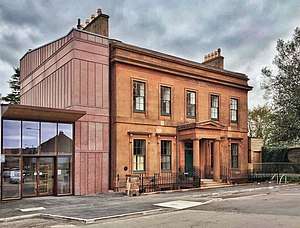Moat Brae
Moat Brae is a Georgian townhouse designed by Walter Newall in Dumfries, Scotland. It was built in 1823 in the Greek revival style. J. M. Barrie, creator of Peter Pan, played in the house and garden as a child from the ages of 13-18 whilst at school at Dumfries Academy. Barrie was later presented with the Freedom of the Burgh of Dumfries in 1924 and in his speech said "When Shades of night began to fall certain young mathematicians shed their triangles and crept up trees and down walls in an odyssey which was long after to become the play of Peter Pan. For our escapades in a certain Dumfries garden, which is enchanted land to me, were certainly the genesis of that nefarious work"

In 1961 the building was granted Category B listed building status,[1] as a classic example of Newall's work. In June 2019 Moat Brae opened as Peter Pan's Enchanted Land and a National Centre for Children's Literature and Storytelling.
Design
Moat Brae is a medium-scale Greek revival villa, rising to two storeys with a raised basement and extending to five bays. It was one of the first houses to be built in what became George Street, Dumfries, and it occupied a large plot of ground that sloped down to the River Nith.
The house is built of polished red ashlar. The roof is slate with corniced end stacks. The front elevation features a central pedimented Doric porch, approached via flyover steps and with spearheaded cast-iron railings adjoining. The house has 12-pane sash windows trimmed in apron-style moulding throughout; those on the ground floor are topped with consoled cornices. The plasterwork features Greek revival ornament, and there is a Doric frieze in the entrance lobby. The interior features—a square central hall with a circular first floor gallery and a domed glass roof—make this one of Newall’s greatest works.
Ownership
Between 1823 and 1914, the house was sold a number of times as a traditional residence.[2] In 1914 it was purchased by The Royal Scottish Nursing Home Institution and, until 1997, remained in constant use as a nursing home (financed through various trusts), complete with private facilities for surgery and medicine.
In 2001 it was again bought privately with the plan to turn it into a hotel. However this never transpired and, in 2008, the building was purchased by Loreburn Housing Association (LHA).[3] In 2009 there were plans to demolish the house but days before it was due to be razed it was purchased by the Peter Pan Moat Brae Trust.[4]
Peter Pan Moat Brae Trust
The Trust was established to save and restore the house and garden and to develop them as Scotland's first Centre for Children's Literature. To do this the Trust has raised over £6m from various funding bodies, foundations and private individuals. Its fundraising campaign was launched in August 2011 by the Trust's patron, Joanna Lumley.
With the help of public and private grant awards, plus donations from the public and community initiatives, the Trust has so far been able to purchase the house and garden from the Loreburn Housing Association for £75,000.[5]
In August 2011, Scottish Culture Secretary Fiona Hyslop announced a grant of £250,000[6] from Historic Scotland to help in the restoration of the building.
A land deal was concluded between Dumfries and Galloway Council and the Moat Brae Trust, whereby council-owned land that runs alongside the River Nith behind Dumfries Academy was sold to the Trust for £1.[7] The council has said it has no use for the land but recognises its importance for the work of the Trust to develop a Centre for Children's Literature.
Moat Brae opened to the public by Patron Joanna Lumley and Secretary of State for Culture Fiona Hyslop as the National Centre for Children's Literature and Storytelling on 1 June 2019.[8]
References
- Historic Environment Scotland. "Moat Brae, including railings, 101 George Street, Dumfries (Category B) (LB26203)". Retrieved 2019-03-27.
- "BBC News - Dumfries Peter Pan house project launched". Bbc.co.uk. 2011-08-02. Retrieved 2012-09-30.
- "Campaign to save Moat Brae House Dumfries". Dumfries-and-galloway.co.uk. Retrieved 2012-09-30.
- "Home | Moat Brae | The Peter Pan Moat Brae Trust | Dumfries & Galloway in South West Scotland | Peter Pan Moat Brae | Walter Newall | Peter Pan Garden | J M Barrie | Support Moatbrae | inspiration behind Peter Pan | Childrens literature". Peter Pan Moat Brae. Retrieved 2012-09-30.
- "Trust buys Moat Brae House". Savebritainsheritage.org. Retrieved 2012-09-30.
- "News Article". Historic-scotland.gov.uk. 2011-08-09. Retrieved 2012-09-30.
- "Dumfries Peter Pan house project secures £1 land deal". BBC News. 2013-01-21. Retrieved 2013-01-21.
- https://www.theguardian.com/books/2019/may/27/jm-barries-peter-pan-house-to-open-as-childrens-storytelling-hub-in-scotland